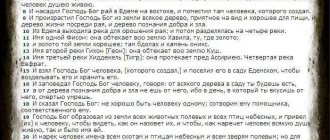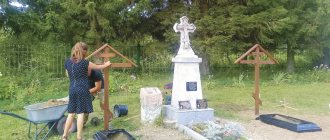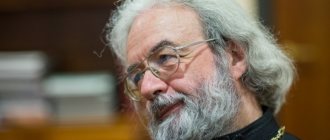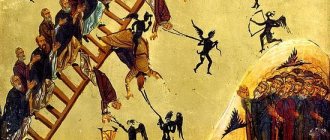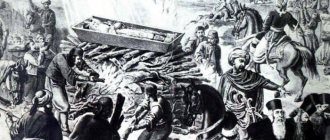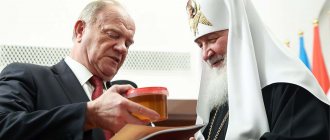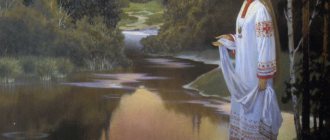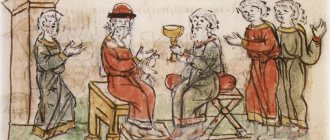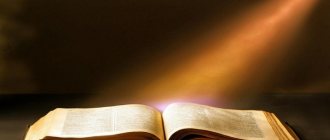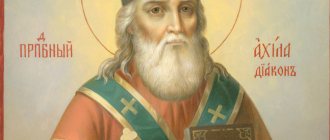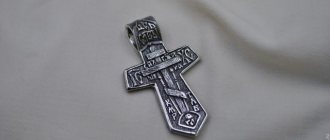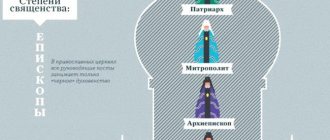For the first time in Pechory
– Father Vladimir, do you remember your first meeting with the elder in your life?
– I was born in Soviet times, in 1949, into an atheist family. And only when I was almost 20 years old, nineteen days before my twentieth birthday, I was baptized. Then I knew nothing about Orthodoxy. I remember that same year my godfather, Lev Sergeevich Lapshin, was a very educated man who graduated from the Faculty of Philology in 1917 and was an assistant to the famous lexicologist D.N. Ushakov, invited me, my brother and his wife to make a semi-secular trip to Leningrad, the Pushkin Mountains and the Pskov-Pechersky Monastery.
It must be said that the Soviet era was special: Orthodox Christians, especially young ones, were persecuted; priests, as a rule, shunned young people because they had to register with the authorized representatives. For their active work, they could be deregistered and given a “wolf ticket”: the priest lost his parish and was forced to look for work other than his calling. Therefore, the questions that naturally arose in my young heart did not find answers from the priests.
So, my godfather of blessed memory suggested that we make this trip.
The Pskov-Pechersky Monastery has never been closed. In pre-war times, it belonged to Estonian lands, but during the war there was no time for closure. Khrushchev tried to put an end to the monastery, but through the efforts of the governor, Archimandrite Alypiy (Voronov; 1914–1975), a man of incredible fortitude and righteous life, and his prayerful boldness, the monastery survived.
We arrived at the monastery, shining with beauty, splendor, breathing the antiquity of Orthodoxy. Pechory amazed us.
– Please remind me what year it was?
– It was 1970.
And then we first met two elders: the future schema-abbot, and then still abbot, Savva (Ostapenko; 1898–1980) and our future spiritual father, Archimandrite John (Krestyankin; 1910–2006). We met Archimandrite John briefly; at first I didn’t even remember him. Then he was a hieromonk.
– Now the names of schema-abbot Savva and Archimandrite John are probably already known to everyone. Was it different then?
– It was different then, but Orthodox people knew their names. This trip impressed me and struck me to the heart. And then I decided to visit the Pskov-Pechersky Monastery, at least occasionally. After some time I returned to Pechory. I remember that my brother and his wife were there again. My brother later became a priest (now Archpriest Anatoly Volgin, rector of the Church of St. Nicholas in the village of Vasilkov, dean of the Ostashkovsky district of the Tver diocese. - A.N.), like me. We arrived with a question about his wedding and talked with Abbot Savva, who said that there was no need to postpone it. The brother and his wife were surprised, they said that they were not ready, that they did not have wedding suits... To which Father Savva answered them: “What, do you need external decorations, and not the grace of the Holy Spirit? After all, the grace of the Holy Spirit surpasses everything external, the whole world!” My brother and his wife agreed and were married with the blessing of the elder.
Spiritual grandchildren.
The magazine's correspondent visited the church where the confessor of the future president's wife serves
If Dmitry Medvedev is elected president of the Russian Federation, “the course that Vladimir Vladimirovich has been pursuing for eight years will be ensured.” Patriarch Alexy II assured his flock of this in a touching televised address dedicated to the personalities of the future and current presidents. The head of the Russian Orthodox Church MP testified that Dmitry Anatolyevich is a sincere Orthodox Christian.
The Ogonyok correspondent visited the church where the confessor of the wife of the future president serves, and learned some details of the religious life of the Medvedev couple.
Confessor
Father Vladimir Volgin is a little over 50 years old, he is short, with a large gray beard and, it seems, an even larger, Socratic forehead, and wears small glasses. Born in Moscow, his education was limited to film technical school, but from the age of 20 he has been serving in the church, so the poet, in his own words, has considerable spiritual experience. Future o. Vladimir and his older brother Anatoly (now he is a dean in the Tver diocese) served as altar servers for Fr. Alexandra Me in Novaya Derevnya, near Moscow, where they entered the circle of dissident church intelligentsia. When in the early 80s the authorities began to persecute Fr. Alexandra, Vladimir went to the Kursk diocese and was ordained by the local Archbishop Chrysostom to a remote rural parish. There he abruptly changed his liberal-ecumenical views to ultra-conservative ones, became close to the “elders” Seraphim and John and wrote a couple of “accusatory” letters to the disgraced Menu.
After the election of Patriarch Alexy IIo in 1990. Vladimir returned to his native Moscow and began attending patriarchal services with his entire family. Alexy II, who loves children very much, paid attention to the little charming daughter of Fr. Vladimir. Soon the “village priest” received an appointment to a parish directly opposite the Kremlin - to the Church of St. Sophia on Sophia Embankment. On the initiative of the Patriarch’s closest assistant, Archbishop Arseny, he was entrusted with a responsible obedience - to build the patriarchal dacha on Rublevo-Uspenskoye Highway. However, “due to a chronic lack of funds,” Fr. Vladimir failed to comply with obedience and fell into disgrace with the patriarch for some time. The restoration of the Church of St. Sophia itself was not very active, the interiors of which even now, 14 years after its transfer to the Russian Orthodox Church MP, look more than modest. An Ogonyok correspondent who visited this church for an all-night vigil found electrical wiring and light bulbs hanging on the walls, a half-empty frame of the main iconostasis, and paper icons pasted onto the side iconostases. Unexpectedly for a temple located in the courtyard of the Rosneft concern office and visited by no means poor parishioners...
The priest’s first serious contact with the press occurred after actress Ekaterina Vasilyeva announced that she “became the spiritual daughter of one of the most powerful, spirit-bearing Moscow priests” - Fr. Vladimir Volgin. Ekaterina Sergeevna is not only a “daughter”, but also the treasurer of the headed Fr. Vladimir of the parish, and the mother of priest Dimitry Roshchin, who serves in the St. Antipies Church “attached” to Sophia behind the building of the Russian State Library. U o. Vladimir has a third temple - as it is written on its website, “under the Presidential Administration.” In fact, the home church of the Three Hierarchs is located in the building of the Arkhangelskoye rest house, which belongs to the Administration and is located on the “canonical territory” of Metropolitan Juvenaly, the administrator of the parishes of the Moscow region. Another church and cultural celebrity serves in the Church of St. Sophia - priest-actor John Okhlobystin. At the temple there is a publishing house and the largest church jewelry store in Moscow, kiosks with products are located on the streets of Moscow and in metro passages.
Thanks to the pastoral care of the rest home, Fr. Vladimir met many Kremlin officials. The small courtyard of his temple is filled with expensive Mercedes and escort jeeps during services. The future “first lady” also comes here...
Expression of Faith
The parish claims that Svetlana Medvedeva “came to church” under the influence of her older sister Ekaterina, who in the same spirit “positively influenced” Irina Abramovich. For “status” women in the Church of St. Sophia, the left choir is reserved, where there are several rows of chairs. Nearby, on a raised platform in front of the iconostasis, there is a lectern, in front of which Fr. Vladimir confesses. In private conversations, the priest makes it clear that he is “caring for” the entire family of the future president. If this is so, then Dmitry Medvedev could become Vladimir Putin’s “spiritual nephew”. After all, Archimandrite Tikhon (Shevkunov) from the Sretensky Monastery on Lubyanka is considered to be Putin’s confessor. And Archimandrite Tikhon, in turn, is the spiritual son of the “elder” John (Krestyankin), who recently reposed in the Pskov-Pechora Monastery.
Prayer for spiritual father
– Father Savva, knowing that I was engaged in literary works (most likely not so that I could show professional abilities), invited me to edit his book. Several books by Schema-Hegumen Savva have already been published...
– There are even audio books of his instructions...
– Yes, and then he gave me a typewritten text for editing and included a prayer for my spiritual father. I heard about him as a man of righteous life, but I did not know what insight was, and, being somewhat vain, I thought: “How good! Father himself offers me to become a spiritual father, and I need, on the one hand, the resolution of many issues that concern my young heart, and on the other, such a great man - I did not know his size, but I understood that he was great - will be mine spiritual father!
– How did you then understand that “he is great”?
– Through people, through what they said about him. And in him, of course, there was something invisible, but tangible. This is probably what is called the manifestation of the grace of the Holy Spirit. He was the bearer of this grace.
And one day after a monastic meal, taking his blessing, I asked: “Father, do you want me to be your spiritual son?” - He replied: “Do you want it?” - I say: “Yes, I want to.” We must pay tribute to the fact that, without thinking, I wanted the spiritual guidance of this righteous man, then not understanding at all what it was.
– At that time, you had only recently been in the Church?
“Recently, I didn’t even know what obedience was, but my soul subconsciously strived for obedience all the time, looking for authorities for itself. I understood that both in any area of human knowledge and in the area of spiritual life, we need a teacher. Thanks be to God! He agreed to become a spiritual father. I did not have such a relationship with him for long, because, I repeat, it was my superficial, emotional desire. During the short time that we communicated, he surprised me with an absolutely amazing talent - his insight. I remember he blessed me to write my first confession. I wrote a confession for my entire life, which was then just a few years old. Somewhat ashamed, I handed it to him. After reading, he said significant words. On the one hand, these words surprised me, but on the other hand, they are coming true in my life. For many decades to come, he saw what would happen to me, to my life, in my life.
Archpriest Vladimir Volgin on non-condemnation
The board of trustees of the program, which accumulates funds for the publication of Orthodox textbooks, the training of teachers of Orthodox culture, the filming of church films, and pilgrimages, includes Fr. Vladimir Volgin. Among the notable members of the council are Archpriest Alexy Zlobin, in whose church Putin prayed on Christmas 2006, Minister Alexander Sokolov, Plenipotentiary Alexander Konovalov, author of the anti-Semitic “Letter 500” Alexander Krutov and owner of the Ile de Beaute chain of stores Valery Volodin. The project is supported by dozens of public organizations, including the radical youth movement “Styag”, which participated in the “Russian March”.
The program office is located in an old mansion on the central Moscow street Solyanka. Father Cyprian admits that so far few people know about the program, but at least five thousand teachers of Orthodox culture have already been trained within its framework. At the same time, the hieromonk is convinced that “96% of Russia’s youth” already “trust the Russian Orthodox Church.” From the highest hierarchy, the program, created with the blessing of the Patriarch, is supervised by the rector of the Moscow Theological Academy, Archbishop Evgeny (Reshetnikov). It was him who Dmitry Medvedev visited on October 19, and it was he who was promised state recognition of church diplomas.
Well-informed in matters of the spiritual life of “top officials,” St. Petersburg abbot Grigory (Lurie) noted in an interview with Ogonyok that, in general, the types of religiosity of Medvedev and Putin differ little: “Both accepted Orthodoxy, but did not understand it.” However, according to the abbot, Medvedev has not yet gotten rid of some illusions regarding the political capabilities of the leadership of the Russian Orthodox Church MP and is inclined to give it more preferences than Putin. Religious scholar Roman Lunkin adds: “If Putin is a believer who was converted to Orthodoxy by the intelligence services for the sake of the country’s interests, then Dmitry Medvedev is an organic Orthodox layman for whom faith is more than a political necessity.” The difference in generations has an effect - Medvedev’s personal development took place in the 80s - early 90s, during the period of the “religious boom” in Russia.
So, Russia is once again waiting for a distinctly Orthodox president and an even more ecclesiastically active and vibrant “first lady.” In the coming years, there seems to be no threat to the formation of a “new type of church-state symphony.”
* The house church of the Three Saints is located in the building of the Arkhangelskoye rest house, owned by the Administration of the President of the Russian Federation.
Alexander Soldatov
up
From death to life
– Didn’t all this – the trip to Pechory, spiritual guidance, insight – conflict with the realities and ideological system of Soviet society, in which you received your upbringing, studied, and simply lived?
– The fact is that my religious process began at an early age. At the age of 6, I was interested in the problems of death, I thought a lot about them, I remember that for sure. I was drawn to the dead like a magnet. We lived in a densely populated area of Moscow, not far from the Garden Ring. People were often buried there, and as soon as I heard about the funeral, I ran to the deceased to try to look into the mystery of death, to understand what exists beyond this life. I could never come to terms with the fact that a person goes into oblivion. This is the first religious movement in my life.
I have always been looking for love, its embodiment (love not for the opposite sex, but for people in general, regardless of gender!), I had the desire to see in people the same love that I myself aspired to. Unfortunately, my life was full of disappointments in this regard, because we lived in an atheistic society, without God we wanted to build the Kingdom of God on earth.
I saw the concentration of all my ideals after reading the Gospel about Christ. And when I was baptized at the age of 20, everything fell into place, “fell into pieces.” But intuitively I understood that now I needed a person who would have great spiritual experience and would share this experience with me. I was a blind kitten, thrown out into the street and immediately lost my mother, I knew nothing about the Church, about the canons of Christian life.
Of course, in that short period, before the trip to Pechory, I made many mistakes, falling away from Christ and losing the initial grace given to me by God during baptism. And so again I began to find it through communication with the elder schema-abbot Savva.
I remember that he liked people to confess not verbally, but to write a confession.
– Were there books with a list of sins, like there are now? How did people prepare for confession?
- No no. There were God's commandments. After all, every Christian soul that is attentive to itself sees dark places in itself and understands deviation from the commandments. Therefore, without any books, I wrote a confession, confessing those ulcers, those diseases that plagued my soul.
One day I arrived early in the morning at the Pechersky Monastery and knocked on Father Savva’s cell. He opened. I gave him a confession. And he, holding the envelope with my confession in his hands, answered all the perplexed questions I asked in this confession, spoke about the main sins listed in it, and gave advice on how to try to improve and move away from the passions that overwhelmed my soul.
– You said that you already met with Father John (Krestyankin) at that time. Were they similar, spiritually close to Father Savva?
– Yes, at the same time I met Father John. It must be said how Father John, then still a hieromonk, was distinguished. He said the same thing as Father Savva, only Father Savva did not have the habit of explaining: do this. Maybe he will add two or three words, but sometimes this was not enough for my soul.
When I came to Father John after meeting Father Savva, he said the same thing (not knowing that Father Savva had given such a blessing!), but he “chewed it,” explained, and his detailed explanations fit into my soul. This is how, visiting the Pechersky Monastery, my soul clung to Father John. But for a long time I did not dare to ask him for spiritual guidance in my life.
Father's insight
- So about ten years passed in various storms, shocks, holes in my ship. My ship sometimes sank, but, by the grace of God, it floated to the surface again. I received many wounds, and ultimately the spiritual relationship between Archimandrite John (Krestyankin) and me began to take shape when he blessed my marriage with my mother. Father’s insight is amazing, and much of what he said has happened and is happening to this day. At some point, my mother and I felt how insight in our lives became a common occurrence when we came into contact with people of holy life. These people could not speak otherwise - grace spilled out through them onto us.
– Weren’t you scared by this insight?
– At first I got goosebumps. I can’t say that I was overcome with horror, but there was a state of trepidation. In some cases, my hearing listened and did not hear, and only then, remembering some words, I understood and was surprised. Then I didn’t pay attention to what was said, because the elder spoke about it “jokingly,” “smiling.” And what he said actually came true.
For example, Father John (Krestyankin), when I was 20 years old, said (eight years before my priesthood) that if I got married, I would become a parish priest.
Several times I entered the seminary, several times I was not allowed in... Not because I was too stupid, but because every time the powers that be prevented me. Ultimately, one inspector of the Moscow Theological Academy explained: “The Cheka will not let you through.” But the authorities treated me negatively, because young people gathered around me, I communicated with dissidents, foreigners, I was a believer, from the point of view of a secular person, and such people were on the radar of the authorities, in particular the KGB, - obstacles were put in front of them and training, and to ordination.
And so, in defiance of the authorities, when my mother and I got married, a month and a half later, Archbishop Chrysostom of Kursk and Belgorod ordained me as a priest, warning: “Get ready to be a priest without a parish, because no one will give you registration.” He was a daring ruler and now remains the same daring Metropolitan of Vilna and all of Lithuania. At his own peril and risk, he ordained me as a priest and convinced the Commissioner for Religious Affairs to accept me into the diocese and register me. The Commissioner was afraid of the “Westerners,” people from Western Ukraine, and Bishop Chrysostom said that he had Muscovites who would be an excellent replacement for the “Westerners.” He happily agreed, but six months later he was fired, although he had worked in one place for 25 years.
Thus the prophecy was inexorably fulfilled, regardless of external circumstances. I became a priest, and Father John (Krestyankin) spoke about this priesthood eight years before.
He constantly showed insight, hiding it in his humility. But it spilled out through him, and he could not contain it within himself. Once, when I was feeling very bad (and I was 40 years old), and the old grandmothers in the rural parish were already worried: “Our father will die by Christmas,” he told me: “You will live longer than me.” And Father John lived for almost 96 years. And I believe him unquestionably.
VLADIMIR VOLGIN
He was an altar boy for Fr.
A. Me in 1974. The younger brother of the priest. Anatoly Volgin. Ordained in Belgorod region. Chrysostom Martishkin at the end of 1970 and began to denounce Me. From ser. 1990s - Rector of the Church of Sophia of the Wisdom of God in Sredniye Sadovniki and the gate temple of the icon of the Mother of God “Seeking the Lost”, they are actually located on Sophia Embankment. Among his spiritual children are the wife of President Medvedev, Ivan Okhlobystin and the actress Ekat. Vasilyeva. Perhaps he wrote a pamphlet against Fr. A. Me under the pseudonym “Sergey Antiminsov”. Answer to him Me, 1984 (here and about V.).
Volgin: up. in Zavalov's memoirs as an unlucky poet who fled to the priesthood. About him in Zorin’s memoir, 1993.
*
Alexander SOLDATOV
Full version of the article published in the Ogonyok magazine, December 17-23, 2007.
Parenting with your own authority
– Father Vladimir, you just mentioned one trait of Father John, the monks of the Pskov-Pechersk Monastery also recalled it, namely, that he hid his insight, hid his feat and did not like to “teach” people verbosely.
- When mother carried our daughter under her heart, we asked Father John: “How to raise children?” I thought the priest would unfold a whole worldview concept before us. And he answered very simply: “If you don’t want your children to drink, don’t drink; if you don’t want your children to smoke, don’t smoke; if you don’t want them to fornicate, don’t fornicate. The authority of your own life."
Even if Father John had been silent, he demonstrated such authority in his own life that the words of Holy Scripture would still have been fulfilled around him: “With the venerable you will be venerable.” That is, without hearing his words, you could become a reverend next to him.
– But there were still cases when he instructed you not only by sight, but also by word?
– It seems that he did not commit violence against the will of man, because he was a source of divine love, and therefore a source of freedom. The Lord gives us absolute freedom, right? But, on the other hand, where it was necessary to show firmness, he showed this firmness.
I once came to Father John in 1991. The Law on Freedom of Conscience and Religion has just been passed. It was possible to return to Moscow: before that, we Muscovites served in the villages of the Kursk and Belgorod regions. I say: “Father, I am invited to become the rector of one of the parishes in Moscow, which is still closed.” And he answers: “Well, in order to move to Moscow, you need to come to an agreement with the patriarch, who is the bishop of Moscow, with those people who invite you, make sure of their consent, and then move.” – I ask: “What about from a spiritual point of view?” “And from a spiritual point of view,” said Father John, “so that not a single petition lies before the eyes of the Bishop.”
"Thy will be done"
– So, you always obeyed unquestioningly?
- I tried to obey. Once or twice I did not listen to the elder in small matters and for this I received the full punishment. I still remember, and my heart still worries, that I did not fulfill a seemingly insignificant blessing under a seemingly respectful pretext... And so, except for these two cases, I always listened to the elder.
– Father Vladimir, what is the correct attitude towards the elder and his advice? I have heard the opinion that you need to go to the elder only when you are faced with a question of life and death and if you are absolutely ready to obey the elder.
– The second one is a prerequisite. You must be willing to accept the blessing. At the same time, Father John always had a desire not to violate personal freedom. He hinted, but did not insist. We must definitely seek the will of God with the intention, no matter how difficult it may be for us to fulfill, to definitely fulfill it!
Mother and I came to Father John (Krestyankin) for a blessing for the marriage and asking for spiritual guidance. Mother and I wanted to do the will of God all the time, to live in the will of God. And even those insignificant questions that we asked childishly, being spiritual babies, helped to outline for us the entire relief of the narrow path. And, thanks to the elder’s answers, we did not break our heads on the obstacles that arose along the way; we bowed our heads and backs in time so as not to hurt ourselves. And people might wonder: why do they go to the elder with such insignificant questions?
Father John taught that there are no minor questions. He said that to those who have gone through everything, they may seem insignificant, but for beginners in spiritual life they are of great importance for the soul and salvation. Therefore, unfortunately, we exploited the elder with a huge number of questions. But years passed, the questions gradually disappeared, and in the end I “strained out a mosquito” before going to Father John, thinking about what to ask. After all, he has already answered all the questions!
Tough blessings from a loving elder
– You said that Father John “hinted, but did not insist.” Have there been cases when the elder spoke about the will of God directly and unambiguously?
“In some cases, he showed definiteness and spoke directly about the will of God, even if it was harsh against me.
For example, my mother and I went on vacation to Cyprus for several years in a row. During our holidays we led a churchly lifestyle and never forgot the Church. We visited monasteries and holy places on the island. Cyprus is an Orthodox state, there is also a Russian parish there. Thanks to the fact that we were in Cyprus, we once happened to visit Jerusalem, which left an indelible impression. But I was sick. This was, I think, the third or fourth time. And when we returned home, I could not walk, I felt enormous weakness in my legs. No, I was moving, but if I stepped on a small pebble, I could fall from weakness in my legs.
Then one of our spiritual sisters, while in Pechory, turned to Father John: “Father, pray for Archpriest Vladimir Volgin, his legs are bad.” Maybe she even said that they were “being taken away,” but she didn’t say anything about where we were vacationing.
Soon Father John gave me the answer through his cell attendant: “If Father Vladimir goes to Cyprus next time, his head will be taken away.” Everything is simple and clear.
Of course, Cyprus immediately flew away for us “far away”. But here, although I am not a traveler and have never sought to go abroad, I felt a painful shock: my freedom was being infringed upon! After this ban, friends living in France, Switzerland, and Italy suddenly began to intensively invite me to visit them. I had not seen one of my friends for many years; I knew that he could not come to Russia. I wanted to go to him, to meet him on his land, in France... And I decided to ask Father John again if it was possible to go and visit friends abroad. He replied: “Didn’t I tell you anything about Cyprus? So do it.” So now, as I jokingly say, I am “not traveling.”
These are the rather harsh blessings we received in life from our loving elder. They corrected me, corrected my mother, corrected our family, corrected our spiritual path, I think saving and protecting us from some storms. After all, our struggle is not with flesh and blood, as the Apostle Paul said, but with the spirits of wickedness in high places. This means that, probably, we would not have been able to withstand, if we had acted in our own way, this battle that was prepared for us by those who want our destruction.
– What helped you to obey your spiritual father and sometimes carry out such “harsh blessings”? This is an example for us, because we do not know how to obey.
– I was looking for obedience, I understood that only through obedience could I gain at least a piece of experience transmitted through a spiritual leader. I also understood that if I did not obey, my spiritual father would push me aside, and I would lose that divine source of life that I had once found.
Archpriest Vladimir Volgin
Archpriest Vladimir Volgin is also the spiritual son of Fr. John; He wrote a whole book about his communication with the “elder”. It turns out that Putin and Medvedev have a common “spiritual grandfather”, although they have different spiritual fathers...
Dmitry Medvedev's religiosity is not advertised - it is not required by his position. Since 2003, when he became head of the presidential administration, Medvedev headed the Council for Interaction with Religious Associations, and since 2005, after moving to the government, the commission on issues of religious associations. He is forced to give equal attention to all “traditional confessions,” although the Russian Orthodox Church MP, as the largest of them, gets more. Thus, in March, Medvedev initiated the process of transferring real estate - churches and land plots - into the ownership of the church, and in October he promised to give state status to diplomas from theological schools and academic degrees of theologians. Speaking on November 19 at the celebration of the 90th anniversary of the restoration of the patriarchate, Medvedev reported that 1.5 billion budget rubles had been allocated for the restoration of churches of the Russian Orthodox Church MP this year, and another 6 would be allocated in the next three years. The Orthodox were somewhat confused only by Medvedev’s visit on December 5 , on Hanukkah, the synagogue in Maryina Roshcha, where he promised the chief Hasidic rabbi of Russia, Berl Lazar, to create an institute of army rabbis and support Jewish education. There has been a slight buzz on Orthodox forums about the fact that Medvedev is a “halakhic Jew” (his mother, Yulia Veniaminovna, is Jewish), as is his wife Svetlana (née Linnik). The image of a “zealot of Orthodoxy” is somewhat distorted by Medvedev’s yoga classes and his own admission that for many years he was fond of the “satanic” group Black Sabbath.
Svetlana Medvedeva, unlike her husband, shows her religiosity more openly. You can see her not only in confession with Fr. Vladimir Volgin, but also at patriarchal services - for example, on December 17, Mrs. Medvedeva prayed at the liturgy at the Marfo-Mariinsky Convent on Ordynka. In April, she headed the board of trustees of the church-state program “Spiritual and moral culture of the younger generation,” led by Hieromonk Cyprian (Yashchenko). The program is officially supported by the presidential administration and the government, and many business sharks are fighting for the right to donate their funds to it. The program’s website states that within its framework “for the first time, the state, Church, business and public of Russia are joining forces to protect the unique spirituality and culture of the country.” The board of trustees of the program, which accumulates funds for the publication of Orthodox textbooks, the training of teachers of Orthodox culture, the filming of church films, and pilgrimages, includes Fr. Vladimir Volgin. Among the notable members of the council are Archpriest Alexy Zlobin, in whose church Putin prayed on Christmas 2006, Minister Alexander Sokolov, Plenipotentiary Alexander Konovalov, author of the anti-Semitic “Letter 500” Alexander Krutov and owner of the Ile de Beaute chain of stores Valery Volodin. The project is supported by dozens of public organizations, including the radical youth movement “Styag”, which participated in the “Russian March”.
The program office is located in an old mansion on the central Moscow street Solyanka. Father Cyprian admits that so far few people know about the program, but at least five thousand teachers of Orthodox culture have already been trained within its framework. At the same time, the hieromonk is convinced that “96% of Russia’s youth” already “trust the Russian Orthodox Church.” From the highest hierarchy, the program, created with the blessing of the Patriarch, is supervised by the rector of the Moscow Theological Academy, Archbishop Evgeny (Reshetnikov). It was him who Dmitry Medvedev visited on October 19, and it was he who was promised state recognition of church diplomas.
***
Well-informed in matters of the spiritual life of “top officials,” St. Petersburg abbot Grigory (Lurie) noted in an interview with Ogonyok that, in general, the types of religiosity of Medvedev and Putin differ little: “Both accepted Orthodoxy, but did not understand it.” However, according to the abbot, Medvedev has not yet gotten rid of some illusions regarding the political capabilities of the leadership of the Russian Orthodox Church MP and is inclined to give it more preferences than Putin. Religious scholar Roman Lunkin adds: “If Putin is a believer who was converted to Orthodoxy by the intelligence services for the sake of the country’s interests, then Dmitry Medvedev is an organic Orthodox layman for whom faith is more than a political necessity.” The difference in generations has an effect - Medvedev’s personal development took place in the 80s - early 90s, during the period of the “religious boom” in Russia.
So, Russia is once again waiting for a distinctly Orthodox president and an even more ecclesiastically active and vibrant “first lady.” In the coming years, there seems to be no threat to the formation of a “new type of church-state symphony.”
From https://www.krotov.info/spravki/persons/21person/volgin_v.html
If Dmitry Medvedev is elected president of the Russian Federation, “the course that Vladimir Vladimirovich has been pursuing for eight years will be ensured.” Patriarch Alexy II assured his flock of this in a touching televised address dedicated to the personalities of the future and current presidents. The head of the Russian Orthodox Church MP testified that Dmitry Anatolyevich is a sincere Orthodox Christian.
The Ogonyok correspondent visited the church where the confessor of the wife of the future president, Vladimir Volgin, serves, and learned some details of the religious life of the Medvedev couple...
…Thanks to the pastoral care of the rest home*, Fr. Vladimir met many Kremlin officials. The small courtyard of his temple is filled with expensive Mercedes and escort jeeps during services. The future “first lady” also comes here...
The parish claims that Svetlana Medvedeva “came to church” under the influence of her older sister Ekaterina, who in the same spirit “positively influenced” Irina Abramovich. For “status” women in the Church of St. Sophia, the left choir is reserved, where there are several rows of chairs. Nearby, on a raised platform in front of the iconostasis, there is a lectern, in front of which Fr. Vladimir confesses. In private conversations, the priest makes it clear that he is “caring for” the entire family of the future president. If this is so, then Dmitry Medvedev could become Vladimir Putin’s “spiritual nephew”. After all, Archimandrite Tikhon (Shevkunov) from the Sretensky Monastery on Lubyanka is considered to be Putin’s confessor. And Archimandrite Tikhon, in turn, is the spiritual son of the “elder” John (Krestyankin), who recently reposed in the Pskov-Pechora Monastery. Archpriest Vladimir Volgin is also the spiritual son of Fr. John; He wrote a whole book about his communication with the “elder”. It turns out that Putin and Medvedev have a common “spiritual grandfather”, although they have different spiritual fathers...
Dmitry Medvedev's religiosity is not advertised - it is not required by his position. Since 2003, when he became head of the presidential administration, Medvedev headed the Council for Interaction with Religious Associations, and since 2005, after moving to the government, the commission on issues of religious associations. He is forced to give equal attention to all “traditional confessions,” although the Russian Orthodox Church MP, as the largest of them, gets more. Thus, in March, Medvedev initiated the process of transferring real estate - churches and land plots - into the ownership of the church, and in October he promised to give state status to diplomas from theological schools and academic degrees of theologians. Speaking on November 19 at the celebration of the 90th anniversary of the restoration of the patriarchate, Medvedev reported that 1.5 billion budget rubles had been allocated for the restoration of churches of the Russian Orthodox Church MP this year, and another 6 would be allocated in the next three years. The Orthodox were somewhat confused only by Medvedev’s visit on December 5 , on Hanukkah, the synagogue in Maryina Roshcha, where he promised the chief Hasidic rabbi of Russia, Berl Lazar, to create an institute of army rabbis and support Jewish education. There has been a slight buzz on Orthodox forums about the fact that Medvedev is a “halakhic Jew” (his mother, Yulia Veniaminovna, is Jewish), as is his wife Svetlana (née Linnik). The image of a “zealot of Orthodoxy” is somewhat distorted by Medvedev’s yoga classes and his own admission that for many years he was fond of the “satanic” group Black Sabbath.
Svetlana Medvedeva, unlike her husband, shows her religiosity more openly. You can see her not only in confession with Fr. Vladimir Volgin, but also at patriarchal services - for example, on December 17, Mrs. Medvedeva prayed at the liturgy at the Marfo-Mariinsky Convent on Ordynka. In April, she headed the board of trustees of the church-state program “Spiritual and moral culture of the younger generation,” led by Hieromonk Cyprian (Yashchenko). The program is officially supported by the presidential administration and the government, and many business sharks are fighting for the right to donate their funds to it. The program’s website states that within its framework “for the first time, the state, Church, business and public of Russia are joining forces to protect the unique spirituality and culture of the country.”
Spiritual father and his child
– You had great confessors – schema-abbot Savva, Archimandrite John. You yourself have invaluable experience in clergy. How would you define the right relationship between a spiritual father and a spiritual child?
– I have been serving the Church in the priesthood for 30 years now. I have many spiritual children. And I will definitely and sincerely tell you: despite the huge number of spiritual children, I do not have the spiritual right to lead them, because I myself am still blind. I convey only that experience (and, perhaps, this is valuable for my children) that I myself gleaned from the spirit-bearing elders and holy fathers.
– What is the difference between just a good priest and an elder?
– The elder is the bearer of the grace of the Holy Spirit. Here I am, a priest, not the bearer of this grace. After my ordination, the grace of the priesthood rests on me. Through this grace I perform, and every priest performs, the sacraments. The elders are the bearers of the grace of the Holy Spirit, the acquirers of the Holy Spirit. And the main gift of the Holy Spirit is the gift of love, patience, and insight. Therefore, Orthodox people would need to look for these elders!
At one time, Father John (Krestyankin) said that “we were familiar with such great pillars of the Church, but we ourselves are no longer the same. But you know us, and after us you will remain, but you will be far from the same”... That is, the grace of God is becoming scarce. And I share with spiritual children the amazing experience that I learned from the elders and from the books that I read and passed through myself. I try not to say anything of my own.
At the beginning of my pastoral life, I may have demanded something from my spiritual children, but now I don’t demand anything, because I know that I am not perspicacious, but I pass on some experience to them, and thank God if they accept this experience.
– Father Vladimir, in your opinion, should impeccable obedience only be given to the elder or to the spiritual father – a simple priest – too?
- Now, I think, yes - impeccable obedience should only be to the elder. Goodness and the desire to obey the spiritual father. But spiritual fathers, who are blind like me, should not demand this obedience from their spiritual children. How can I, a blind person, demand obedience, which can ultimately lead a person into a pit? Where will the blind lead the blind? Into the pit. Both are sure to fail. Therefore, I show the most reasonable, in my opinion, leniency towards my spiritual children and do not demand that they obey me. I demand obedience to the commandments of God, obedience in relation to the established rhythm of confession and communion.
№40 (841) / October 27 '15
Conversations with the priest
In this topic:
Conversations with the priest
Priest Vasily Seliverstov: How to combine work and family
Conversations with the priest
Hieromonk Macarius (Markish): If the “taste for life” is lost...
Hello, today our guest is the rector of the Church in honor of Sophia the Wisdom of God on the Sofia Embankment in Moscow, Archpriest Vladimir Volgin.
Hello, father, bless our TV viewers.
- Hello. God bless.
The topic of today's program is “Confessor and clergy.” Who is a confessor?
– In a sense, I share the terms “spiritual father” and “spiritual father.” This is my personal understanding and maybe I'm wrong.
A confessor is a priest who constantly receives Confession from a given person. People go to church and regularly confess to one priest. They consider him their confessor because they ask him for advice and regularly open their souls to him. This is probably where clergy is limited.
A spiritual father is a kind of secret relationship between a spiritual child and a priest. This relationship is sometimes compared to marriage. We remember how the Apostle Paul speaks about marriage, that husband and wife are one flesh, and this mystery is great. That is, neither mother and son, nor father and daughter or son, but only husband and wife. Only here is a mysterious spiritual union concluded. A similar spiritual union is concluded between a priest whom a Christian chooses to be his spiritual father.
A spiritual father is a person who educates in the spirit of Christian Orthodox piety a person who surrenders himself to his will, on the one hand, and, on the other hand, enters into this relationship. How we were raised by our father and mother every day, and maybe our parents still advise us something from their great deep experience, and we listen to them. Moreover, we must listen to our spiritual father. The spiritual father must convey special experience associated with the narrow path to salvation. The spiritual father nurtures the human soul and nurses it. The spiritual father gives birth to a spiritual child into spiritual life and the spiritual world. This is the secret of the relationship between a spiritual child and a spiritual father.
Of course, when a person elects a spiritual father as his leader, he, first of all, must decide at all costs to do everything that the spiritual father advises him. He should see this obedience as the subject of his spiritual growth.
Let me give you an example from my own life. I very much obeyed my spiritual father, Archimandrite John (Krestyankin), and if I didn’t listen, it was because of my spiritual eclipse, when at some point I became spiritually blind. Moreover, I did not listen once, in what seemed to be the most insignificant matter, but then I realized that I had made a big mistake.
Between 40-45 years old I was very sick, I had very strong stomach pains, and sometimes my body couldn’t even accept liquid food and water. My mother kept asking our confessor for his blessing to do a thorough examination of my body in order to choose the right treatment. For a long time, the priest did not bless, but he was by no means against medicine and treated people who were not treated with great contrition. He said that the sin of refusing treatment is tantamount to the sin of suicide, he called on everyone to get treatment and was treated himself. And suddenly he didn’t bless me to go to the doctors.
I have a guess that the priest, in his insight, knew that as a result of the examination an operation would be proposed, and that the operation could not be allowed.
My mother and I arrived at the Pskov-Pechersky Monastery and expected to meet Father John. I couldn’t find a place for myself: I would like to lie down, but I can’t, I can’t sit, and I squatted in the corner, exhausted. Father John comes, talks to one of the visitors and asks me to run to the Archangel Cathedral, find a monk there, take something from him and bring it. Since I understood that in order to complete the assignment, I would have to make at least four difficult marches - the Archangel Cathedral is located at the top of the bowl in which the Pskov-Pechersky Monastery is located. I understood perfectly well that already on the second march my soul could fly away from my mortal body, but I could not help but fulfill the obedience given by my spiritual father.
I managed to reach the Archangel Cathedral, the soul, as you can see, remained in the body, but I did not find the monk and returned empty-handed. Father John just grinned into his mustache in response to my story. Perhaps some point of no return has been passed. It is surprising that from that moment my illness began to recede.
And after some time, Father John says that I must conduct a thorough examination of the body, and if an operation is required, do not hesitate and agree to carry it out. The examination was done, nothing was found, no surgery was required, and the painful symptoms practically disappeared.
Your obedience served to further your healing. In the Orthodox community there is a saying that obedience is higher than fasting and prayer. Is this true or is there some nuance?
– This saying is based on a correct and deep understanding of obedience. But from a human point of view, as in the example of Father John, who did not bless me for some time to go to the doctor with my pain, this is higher than fasting and prayer. Any obedience to the spiritual father, who knows the will of God, becomes higher than fasting and prayer.
This in no way demeans either fasting or prayer. We remember how in the Gospel, Christ’s disciples could not cast out the demon from the boy and asked Christ why they could not do this. He answered them: because you are of little faith, and this race is driven out by prayer and fasting. So fasting and prayer are the virtues that we should strive to fulfill.
Skill in performing fasts and constancy in them, of course, train a person’s soul so that a person, to some extent, still imperfect, can control his passions. In the worst case scenario, it will not allow you to fall into one passion or another.
Let me give you another example. Once Father John said to me to a venerable clergyman, also exhausted from illness, a celibate priest, not a monk, who had not eaten meat for 30 or 40 years: “You need to drink chicken broth, otherwise you will become so exhausted that you will die.
I saw the reaction of this venerable priest; he did not say anything, but there was a spark of amazement in his eyes. And the priest says: “Don’t be embarrassed.” We recommended one female schematizer to drink chicken broth, and she remained alive. So drink up and don't be embarrassed.
He began to use this broth, began to feel better, gained strength and is now quite stronger physically. This is what obedience means above fasting and prayer. For many decades he did not eat meat, and the priest gave him the blessing to drink broth until he recovered.
Can all issues be discussed with a confessor, for example, issues of personal life?
– The relationship between a spiritual child and a spiritual father should be extremely open, especially now. If Father John (Krestyankin) possessed the spirit of clairvoyance, and I knew many elders who possessed this spirit, then we, the modern generation of priests, are not clairvoyant. Of course, by the movement of God's grace, sometimes we say what pleases God and what hits the target. Sometimes you are even surprised by this. And people think that this priest is so perspicacious.
The Gospel describes the prophecy of the Jewish high priest Caiaphas, the Antichrist, who sentenced Christ to death on the cross. He says: it is better for one person to die for the whole people than for the whole people to perish. The Apostle and Evangelist John the Theologian writes that he pronounced this prophecy because he was high priest for this year. It would seem that he was a fighter against God, but by the grace of the high priesthood he uttered a prophecy.
So we sometimes pronounce a prophecy without realizing it. If the God-bearing elders, being carriers of the Holy Spirit, knew what they were saying, and the will of God was somehow communicated to them, then we will say and immediately forget. That is, the grace of God, through the grace of the priesthood, also acts through us, only it acts not within us, but through us. It is as if we are in some cases conductors of the will of God.
Because we are not perspicacious, in order to better see and understand a person’s spiritual difficulties, a person must open himself up to us. Like a patient who tells the doctor in detail where and how it hurts, he tries to tell about himself in as much detail as possible so that the doctor can make an objective diagnosis based on them. Likewise, we need to know the soul of a person so that this collaboration will be good and blessed in the life of that spiritual child who wants to succeed in spiritual life.
If, for example, a person at Confession says that he does not know how to pay off his mortgage loan, can the priest answer such a question?
– When a certain young man speaks to Christ about the property that he must divide, Christ answers him: who appointed me to divide someone else’s property? Christ came to teach the Kingdom of God, and not how to take out loans.
When spiritual children come to me with the question of whether it is worth taking out a mortgage loan, I answer that here you need to measure forty times and cut once. Because any loan is associated with interest, and you need to calculate your capabilities, strengths, and force majeure circumstances that may arise.
I remember that I started some business without asking for the blessing of Father John, who was our common spiritual father with my mother. After some time, I asked the question whether I should continue this business, to which he replied: “You yourself decided this, so why ask now?”
I would answer: “You took out a mortgage loan yourself, and didn’t ask me to take it or not to take it.” Why now should I answer what to do, due to the fact that you cannot pay this loan.
Some spiritual children ask to bless a vacation somewhere even though they have already bought tickets. This is such a funny and often repeated story. I sometimes even dissuade people who confuse days and fasts and take tickets during fasting. Christians should lead more focused lives. The elders did not even like it when spiritual children came to them during fasting, believing that the road scatters a person’s attention and spiritual life.
By what criteria to choose a spiritual father?
– Of course, a priest must lead a virtuous life, must strive to fulfill the commandments of God and love the Divine Liturgy, fulfill all the posts blessed by the Holy Orthodox Church.
Be not irritable, be sure to be generous, understand that there is no person without sin. I often turn to the Lord with the following prayer: “Lord, you commanded your disciples to forgive the sins of loved ones up to seventy times a day.” Trusting in Your endless mercy and love, I ask You, Lord, for forgiveness, perhaps for the millionth time, but Your mercy is inexhaustible.
Be merciful towards people as well as towards yourself.
We live in difficult times: on the one hand, we see a reviving Church. When the law on freedom of religion was passed in 1990, no one imagined that the Church would flourish so much. The spiritual land was scorched, over which a skating rink of cynical atheism passed more than once. People were afraid to profess their faith; they propagated that the Church was the lot of illiterate old men and women. And suddenly there was such a flourishing of Orthodoxy. The Church is now filled with people of science, creative intelligentsia, people occupying various positions in the hierarchy of Soviet power. Vladimir Vladimirovich Putin considers the state-forming religion of Orthodoxy, and speaks about this publicly. We see children and youth receiving communion. This is an amazing, rapid flowering of Orthodoxy.
Until 1988, there were approximately 46 churches in Moscow, now there are about 1000. Priests now have more than one education: both higher secular and spiritual, they defend both candidate and doctoral dissertations. All this, of course, falls on the religious transformation of Russia.
On the other hand, we are spiritually feeble and weak. I pray for the repose of the 11 visionary elder monks whom I knew. From my point of view, these are holy people, and they are praying for us, who are going through a very difficult path to God here now. The Monk Sirach says: with the monk you will be reverend. And in another place he says: bad customs corrupt the soul of a person, and we live among bad customs. It’s good that priests like me spend the entire time from 6 a.m. to 12 at night only with matters related to the Church; it’s good that we communicate mainly with believers, and there is no free time left at all. Because as soon as there is a backlash, passions appear that incite something not good. We live in such a world, and even the priests who celebrate the Divine Liturgy and constantly partake of the Holy Mysteries feel this.
Thank God that we have such a lamp as the confessor of the Patriarch, Schema-Archimandrite Eli, but this is a different generation of elders. He who searches may not find anyone. Pachomius the Great spoke about the time in which we live in the 4th century. He said that in ancient times, that is, during the first four centuries, Christians not only fulfilled the commandments of God, but also imposed additional labors on themselves. We, says Pachomius the Great, only fulfill the commandments of God, and in recent times - he is already talking about us - Christians will not fulfill the commandments of God, but whoever endures to the end will be saved and receive greater crowns than we who fulfill the commandments of God. The brethren were upset: how could that be? Why is that? Pachomius replied: “If one of us falls now, several strong-willed men will gather around him, who with prayer will raise their brother from the fall.” But in recent times there is nothing like this even for thousands of kilometers.
We live in such difficult times. However, we do not need to be discouraged. In Soviet times, when we became priests, it was difficult to obtain a Bible printed by the Moscow Patriarchate. We bought one copy at a time by special order of the bishop. And now the Holy Scriptures are available to everyone. How many books of the Holy Fathers have been published? It seems to me that such diversity and such circulation of spiritual literature did not exist before the revolution. We are inundated with very good spiritual literature, although, of course, there are books with wrong views that we do not recommend reading.
When Saint Ignatius (Brianchaninov) spoke about these difficult times, he said: “Do not be embarrassed, dear brothers and sisters, then surround yourself with the holy fathers, read and draw from the holy fathers the experience of spiritual life.”
I do not recommend reading the desert-dwelling ascetics. You can, of course, read it to know, but under no circumstances should you apply it to your own life. We live in the world, we have different problems.
But there are other ascetics who turned, in fact, to the world: St. Tikhon of Zadonsk, and Theophan the Recluse, and the Optina elders, and Father John of Kronstadt. From them we can emphasize very important answers to the questions that we pose in connection with our spiritual life and human life in general.
Despite the severity, we have a lifeline in the form of the holy fathers of the Russian Orthodox Church.
Question from a TV viewer from Yekaterinburg: Why in recent times most Orthodox people do not have spiritual fathers. Does a person's salvation depend on whether he has a spiritual father or not?
– The spiritual father conveys the spiritual experience through which he went. When a person advises what he has suffered through his spiritual experience, the power of the word becomes different.
On the other hand, regardless of whether we have a spiritual father or not, we can still be saved. We remember the rich young man who asked Christ how he could be saved. The answer was: fulfill the commandments of God. Those commandments that were given to the prophet Moses at Sinai. If we exactly fulfill God’s commandments, we will be saved.
Can a confessor impose his will on a spiritual child?
– There are such confessors. Perhaps at one time, when I was a young priest, I was zealous and sometimes wanted to impose my will. Then I grew up and realized that I was doing wrong.
After all, the Lord gave man freedom; this is a great gift that we should cherish and appreciate not only in ourselves, but also in another person.
I remember how all the elders, headed by Elder John Krestyankin for me, never imposed their will. They dealt with people's souls very carefully.
From my life I know how delicately Father John (Krestyankin) treated human freedom. But, of course, he never encouraged sin, he burned out sin in a person with his words. I think that when he denounced a person - of course, he did not do this in front of everyone - he was as if at the Last Judgment. But in all other circumstances of life, he always tried to rely on human free will.
Transcript: Yulia Podzolova
You can view or listen to the full version of the conversation on the website of the Soyuz TV channel.
In other rooms:
“Yes, not to court or condemnation”
– Is the rhythm the same for everyone or is it different for everyone?
– I think it’s different for everyone. Although the Monk Seraphim of Sarov, when asked how often one should receive communion, said, “the more often, the better,” let the confessor decide. Everyone's life is different. One, for example, is possessed by a lustful passion, and how can you tell him: “Take communion every week”? Impossible. He did not break away from this passion. Another is struggling with one passion or another, and on the contrary, he needs support. After all, when we go out with the holy gifts, we read the prayer of John Chrysostom: “Let it not be for judgment or condemnation... but for the healing of soul and body,” that is, communion happens for judgment and condemnation, but sometimes for healing. When we see that a person is advancing, then “for healing” we can speed up the rhythm of the sacrament, and vice versa, when we see that “for judgment and condemnation.” Not because I want to remove the person, but because it is more beneficial for him - it is dangerous to accept holy gifts and be in a sinful state, not wanting to get out of this sinful state. You understand?
– How often did your spiritual father , Archimandrite John (Krestyankin) advise you to take communion?
– Father John was a supporter of frequent communion, I reliably testify to this. He recommended that people leading a full-fledged Christian lifestyle receive communion approximately once every two weeks, plus major holidays. Is this common or not?
Once we came to a monastery during Soviet times, and the priest was preaching a sermon. He said that previously, according to the rules of St. Basil the Great, the Church excommunicated people from communion for fornication for 10 years, and for adultery for 15 years. But now we, priests, as soon as they come up to us and confess these sins, we are immediately allowed to receive communion, realizing that we live in neo-pagan times. Yes, we will give an answer for taking on this responsibility. But people must be allowed to take communion!
I remember one priest came to Father John with this question. He allowed his mother to receive communion every week and asked: “Are you blessing?” Father, it seems, did not answer anything - neither yes nor no, but left it up to the discretion of that priest. And if he were against it, he would say: “Why does your mother receive communion so often?” He would not have hidden it, because he was a zealous man and did not want people to not live up to the grace that they receive during communion.
Love, peace and generosity
– What are the main lessons you learned for yourself, for pastoral ministry, from communicating with the elders you met?
– Before ordination to the priesthood or shortly after it, I asked Father John to give me instructions for the priesthood, to tell me what a priest should be like. He replied: “Be extremely strict with yourself and generous with everyone who turns to you.” I inherited this as a seal.
– Today they often talk about old age. What is true eldership?
– Since I have met seven elders in my life, I pray for each of them, they have all already gone to God, I can say with confidence that an understanding has opened in my heart, a certain indicator has appeared that can at least relatively distinguish the spirit of the senile from the non-senile.
- And what is this spirit? Who is a true elder?
– The elders are love, peace, generosity, condescension towards a person’s weakness and the desire to lead him out of this weakness, vision and vision of the soul from the inside, a personal hint concerning this particular person, a vision of his future. The elders motherly nurture the soul of a Christian devoted to them, like a mother, raising a child from infancy. These are people who are in the constant grace of God. They could exclaim along with the Monk Simeon the New Theologian, the acquirer of the Holy Spirit: “Leave me, let me go to my cell, lock myself in it, so that I can talk personally with God again and again.” These are people who love God and, out of love for Him, fulfill the commandment of sacrificial love for those who need their help.
– You said that you had to visit both the Holy Land and Cyprus. You've probably read the works of the Greek elders in translation. Do you think the spirit of our and the Greek elders is the same or not?
– They differ only in personal characteristics, personal properties, but the Holy Spirit is unchangeable. The bearer of the Holy Spirit in Russia, and in Greece, and in Romania, and in Bulgaria is one, with the same gifts that the Apostle Paul points to when speaking about the gifts of the Holy Spirit. And above all, it is love.
